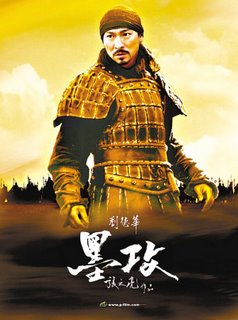

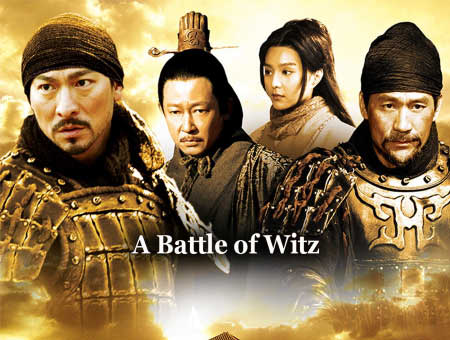
Jacob Cheung feels like an odd choice to direct
such a large film with the vast logistical planning needed and the ability
to show the large action set pieces in a way that makes sense to the audience.
His previous films have primarily all been very small intimate dramas of
which a number have received some acclaim - "Cageman" (1992), "Intimates"
(1997), "The Kid" (1999) and "Midnight Fly" (2001) - so what drove the decision
of the producers to chose Cheung is rather a mystery - but on the other hand
who would have thought Ang Lee, Xiaogang Feng, Zhang Yimou and Chen Kaige
had the makings of being wuxia directors in them (o.k. it is still open
to debate whether Chen Kaige ("The Promise") has the makings of this or
not!). Therefore what is so surprising about this film is that though the
action is generally very solid (helped no doubt by the skills of veteran
choreographer Stephen Tung Wai), the dramatic elements of the film are sadly
lacking in emotional resonance. You never really care about any of the characters
or what happens to them because they are either cardboard cutouts, not particularly
interesting or simply not at all likable. Complicated relationships are
what Cheung has always based his stories on but here there is no time to
develop them in a meaningful way and the one serious attempt to do so in
a romance of sorts flounders like a dying fish on the shore.
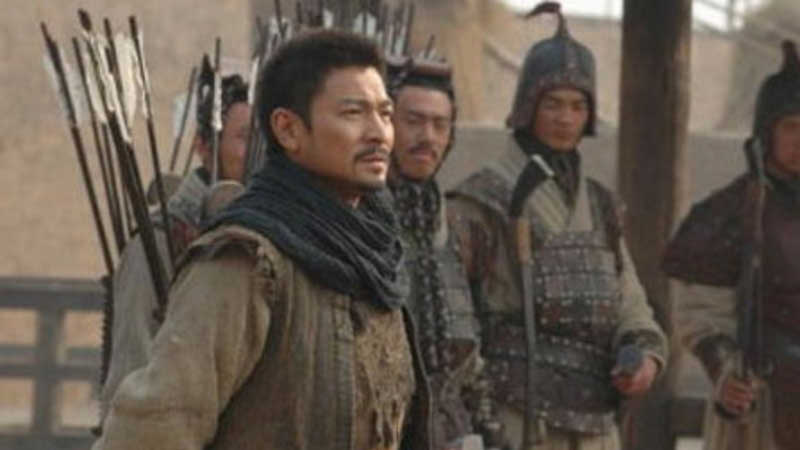
The film is set in the historical period of the
Warring Kingdoms (5th century BC to 221 BC) in which a number of states
were in a constant struggle for power against one another. This was finally
brought to an end when the Qin Dynasty defeated them all and unified China
(the setting for "Hero"). The Liang army of 4,000 men is beseiged behind
the walls of their fortress facing the 100,000 man army of Zhao and time
is quickly running out. They have sent for the help of the Moxian clan -
a fascinating school who devoted themselves to philosophy and military strategy
based on the teachings of Mozi. They were experts on fortification and would
assist any kingdom that was being invaded as a means of bringing peace to
the land - in a sense pacifist warrior philosophers. Only one shows up -
Ge Li (Andy Lau) - and he immediately shores up their defenses and waits
for the attack. On the other side is Xiang Yan-zhong, the commander of the
Zhao force (portrayed by Korean legend Ahn Sung-ki - no doubt in an attempt
to bolster the Korean box office as is the inclusion of another Korean actor,
Choi Si-won who plays the son of the Liang Emperor), a forceful personality
who becomes obsessed with defeating this runt of a kingdom as all of his
various attacks are stymied by the Mozi defenses - thus turning the fight
as much into a battle of wits as one of blood and courage.
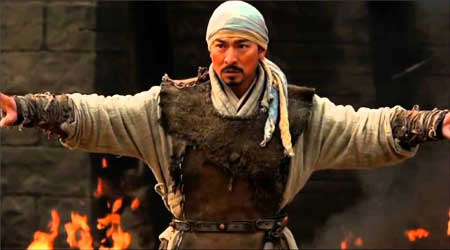
Two main factors cause the film to stumble badly
at times - the most glaring being a forced romance between Ge Li and the
female cavalry commander Yi Yue (Fan Bingbing). This was injected into the
film apparently over Andy's objection and is not a part of the Japanese manga
upon which the film is based. Audiences want romance was the thinking, but
it makes no sense in this situation and brings the proceedings to a dead
halt whenever it pops its ugly head up. Even more objectionable is that the
character of the woman begins as a tough cavalry officer but one look at
Gi Li's manly stature (and very modern haircut) and she quickly turns into
this helpless, swooning babe dressed in silk desperately trying to seduce
Andy. It sets Hong Kong film feminism back a hundred years.
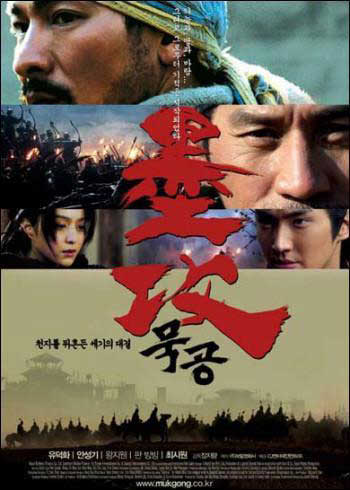
The other issue is more one of choice - Andy plays
his character in such a stern faced, humourlessly one note performance that
it is impossible to see him as human - he is more a burning symbol of philosophical
thought and noble behaviour than flesh and blood. If Gi Li was alive today
he would be a GQ model, the Governor of California, head the United Nations
and in the running for the Nobel Peace Prize for bringing harmony to Iraq
(because only Gi Li has a chance of doing that). Angelina Jolie would be
knocking on his door asking for a blessing and a little nookie. Gi Li would
of course skip the nookie. Thus you never warm up to him and without him
being an object to root for there is no one else to turn to in this film
because almost everyone else in the film - high and low in status - are treacherous
(including the Liangs) or irritating (Yi Yue). Only the honorable Liang archer
commander played by Nicky Wu intrigues but his character is never fleshed
out.
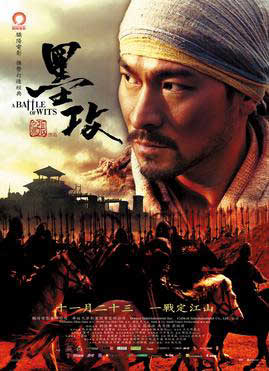
In the end the film is one that you wish you could have liked more for its fascinating historical context and the enjoyable large realistic action set pieces but it never really connects on an emotional level - primarily only on a visual one.
A small pleasure for Hong Kong fans is the inclusion of Wu Ma as the conniving advisor to the Liang Emperor played by Wang Zhiwen.
From the Photo Book
To read more about Mozi, check out this link to Wikipedia: